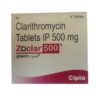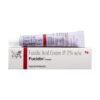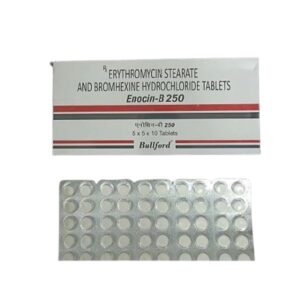- Acne
- Alzheimers
- Anti Allergy
- Anti Biotic
- Anti Cancer
- Anti Cougulant
- Anti Depressant
- Anti Diabetics
- Anti Parkinson
- Anti Prostate Cancer
- Anti Pyscotic
- Anti Sleep
- Birth Control
- Blood Pressure
- Bodybuilding
- Breast cancer
- Constipation
- Diarreha
- Erectile Dysfunction
- Eye Care
- Fungal Infection
- growth Hormones
- Hair Care
- Heart Attack
- High Blood Pressure
- High Cholestrol
- Inhalers
- Insomnia
- Men's Health
- Migrane
- MultiVitamins
- Muscle Relaxant
- Nausea
- Painkillers
- Parkinson
- Skincare
- Steroids
- Uncategorized
- Weight Loss
- Women's Health
ENOCIN B 250 MG
Enocin B 250mg Tablet: Uses, Benefits, and Information
Overview: Enocin B 250mg tablet contains Erythromycin (250mg) as its active ingredient. It is a macrolide antibiotic used to treat various severe bacterial infections, including those affecting the respiratory tract, skin, throat, ears, nose, and intestines. It also helps in treating infections caused by sexually transmitted organisms like Chlamydia trachomatis and Neisseria gonorrhoeae.
Erythromycin works by inhibiting bacterial protein synthesis, halting bacterial growth, and preventing further spread of the infection. However, it is ineffective against viral infections.
Common Uses and Benefits: Enocin B is prescribed for the treatment of several bacterial infections, including:
- Respiratory Tract Infections: Community-acquired pneumonia, bronchitis, pertussis, tonsillitis.
- Ear, Nose, and Throat Infections: Acute otitis media, tonsillitis.
- Skin and Soft Tissue Infections.
- Sexually Transmitted Infections: Syphilis, pelvic inflammatory disease, chlamydia, gonorrhea.
- Gastrointestinal Infections: Stomach and intestine-related bacterial infections.
- Other Conditions: Prophylaxis for rheumatic fever.
Note: Your healthcare provider may prescribe this tablet for other bacterial conditions based on their discretion.
Composition: Each Enocin B 250mg tablet contains Erythromycin (250mg) as the active ingredient.
How Enocin B Works: Erythromycin, the active ingredient, inhibits the synthesis of proteins that bacteria need to grow and survive, thereby stopping the infection from spreading. It’s effective against a broad range of bacterial strains, including those responsible for pneumonia, bronchitis, and some sexually transmitted infections.
Contraindications & Cautions: Before using Enocin B, consult your doctor if you have:
- Hypersensitivity (allergy) to erythromycin or any other ingredient in the formulation.
- Prolonged QT interval (heart condition).
- Significant bradycardia (slow heart rate).
- Hepatic impairment (liver problems).
- Myasthenia gravis (muscle weakness disorder).
- Low potassium or magnesium levels.
- Coronary artery disease or prolonged cardiac repolarization.
Use caution if you have any of the above conditions, and inform your doctor about any existing health issues.
Side Effects: Enocin B is generally well-tolerated when taken as prescribed, but some side effects may occur:
Common Side Effects:
- Headache
- Nausea and vomiting
- Abdominal pain
- Diarrhea
- Swelling of face, lips, or throat
- Dark urine
- Muscle weakness
Serious but Rare Side Effects:
- Blurred vision
- Yellowing of the skin or eyes (jaundice)
- Hearing loss
- Skin blistering
- Unexplained weight loss
- Chest tightness
- Chills and unusual tiredness
If you experience any serious side effects, contact your healthcare provider immediately.
How to Use:
- Take Enocin B exactly as directed by your doctor. Do not take the medicine for shorter or longer durations than prescribed.
- Ideally, take the tablet on an empty stomach—either 30 minutes before meals or at least 2 hours after meals for maximum effectiveness.
- If you miss a dose, take it as soon as you remember, unless it’s almost time for your next dose. In that case, skip the missed dose and resume your normal dosing schedule.
Important: Even if your symptoms improve, continue the medication until the prescribed course is completed to avoid relapse of the infection.
Overdose: In case of overdose, symptoms may include:
- Dizziness and fainting
- Irregular heartbeat
- Severe abdominal pain
- Blood or mucus in stool
- Persistent diarrhea
- Convulsions
Seek medical help immediately if an overdose is suspected.
Warnings & Precautions:
- Kidney: There is limited information on the safety of Enocin B for patients with renal (kidney) issues. Consult your doctor before use if you have kidney problems.
- Liver: Enocin B should be used cautiously in individuals with liver disease. Signs of liver issues include jaundice (yellowing of skin or eyes), dark urine, and clay-colored stools.
- Pregnancy: Use during pregnancy is not recommended unless the benefits outweigh the risks. Always consult your doctor before taking this medication during pregnancy.
- Breastfeeding: Erythromycin passes into breast milk. It is advisable to consult a doctor if you are breastfeeding.
- Alcohol: Avoid alcohol while using Enocin B as it may increase the concentration of the drug in the body, potentially leading to severe side effects.
- Driving: Enocin B generally does not impair your ability to drive. However, if you experience side effects like dizziness or blurred vision, avoid driving or operating machinery.
Drug Interactions: Enocin B may interact with several medications. Inform your doctor if you are taking any of the following:
- Fungal Infections Medications: Ketoconazole, fluconazole.
- Cholesterol Lowering Medications: Atorvastatin, lovastatin.
- Blood Thinners: Warfarin.
- Gastric Medications: Cimetidine, cisapride.
- Mood and Epilepsy Medications: Pimozide, alprazolam, phenytoin, carbamazepine.
- Heart Disease Medications: Digoxin, quinidine.
Precautions:
- Do not use Enocin B past its expiry date.
- Store the tablet in a cool, dry place at room temperature (20-30°C).
- Do not alter the recommended dosage or take it for longer than prescribed by your doctor.
FDA Pregnancy Category: Category B: Animal studies have not shown a risk to the fetus, but there are no adequate studies in pregnant women. Consult your doctor before use.
Frequently Asked Questions:
- What is Enocin B used for? Enocin B is used to treat severe bacterial infections like pneumonia, bronchitis, and skin infections. It can also treat certain sexually transmitted infections and other bacterial infections.
- Can I take this daily? Yes, take as prescribed by your doctor. Typically, the recommended dose is two tablets per day, with at least six hours between doses.
- Is this medicine harmful? Enocin B is usually safe when taken as prescribed. Overdose or misuse can lead to side effects like dizziness, irregular heartbeat, and severe abdominal pain.
- Can I take it with food? It is best taken on an empty stomach for better absorption, either 30 minutes before meals or 2 hours after meals.
- Can I drink alcohol? Avoid alcohol while taking this medication, as it can interact with Enocin B and lead to severe side effects.
Alternate Medications: If Enocin B is unavailable, other erythromycin-based alternatives include:
- Althrocin 250mg Tablet
- Eltocin 250mg Tablet
- Erythrocin 250mg Tablet
- Generic Erythromycin 250mg Tablet
Note: Always consult your healthcare provider for personalized advice before using this medication.
Buy 1 Get 1 Free
Unbetable Quality
Recent Products

Use Coupon Code
Z24U
Recent Products
Our Partners





CEFLOX EYE DROP
Omnacortil 10Mg
Super Lash Ophthalmic Solution
You may add any content here from XStore Control Panel->Sales booster->Request a quote->Ask a question notification
At sem a enim eu vulputate nullam convallis Iaculis vitae odio faucibus adipiscing urna.













Reviews
There are no reviews yet.